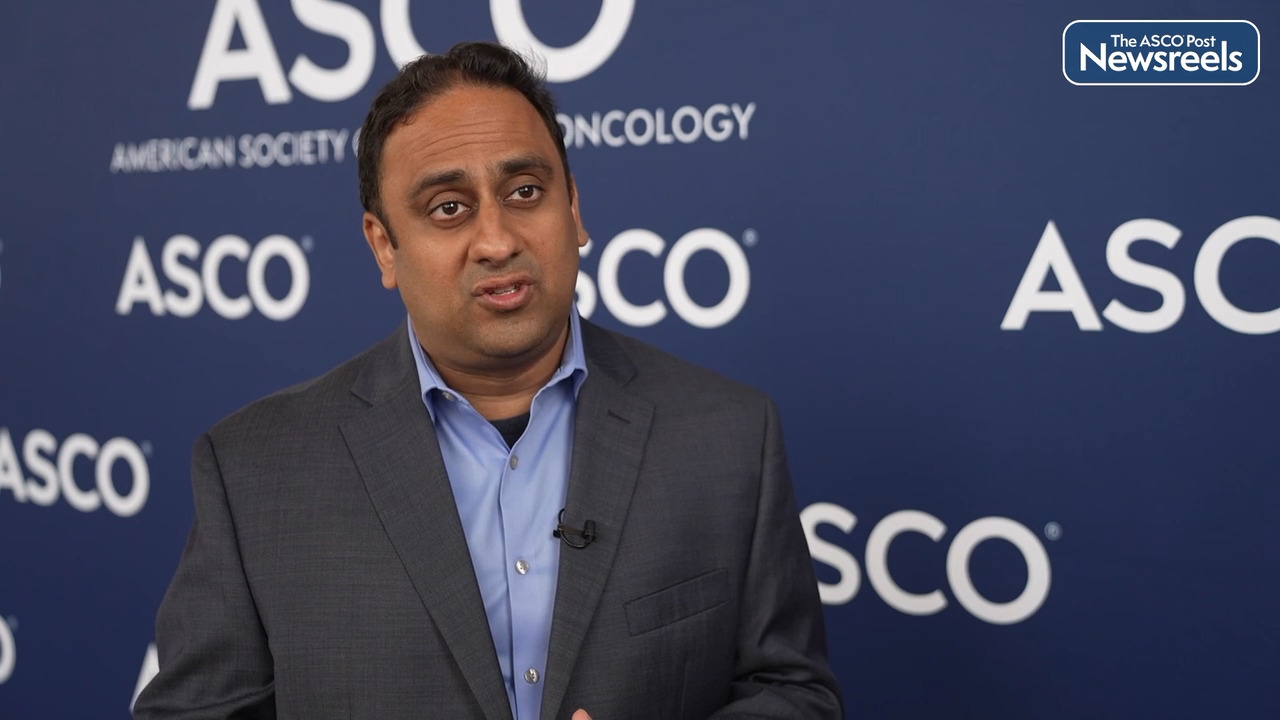Arlene O. Siefker-Radtke, MD, on Metastatic Urothelial Carcinoma: New Data on Erdafitinib vs Chemotherapy From the THOR Study
2023 ASCO Annual Meeting
Arlene O. Siefker-Radtke, MD, of The University of Texas MD Anderson Cancer Center, discusses phase III findings showing that for patients with advanced or metastatic urothelial carcinoma and FGFR alteration who already had been treated with a PD-(L)1 inhibitor, erdafitinib significantly improved overall and progression-free survival, as well as overall response rate, compared with investigator’s choice of chemotherapy (LBA4619).
Transcript
Disclaimer: This video transcript has not been proofread or edited and may contain errors.
Arlene O. Siefker-Radtke:
We now have results from the THOR clinical trial studying erdafitinib in patients who have metastatic surgically unresectable urothelial carcinoma, who've received prior therapy for their tumor. This is the first clinical trial, showing proof of concept benefit from FGF targeted therapy, compared to what's been observed with chemotherapy.
The design of the trial takes patients who've had prior treatment, typically chemotherapy with platinum or carboplatinum, and patients may have had an immune checkpoint inhibitor. There are two cohorts to this trial. The cohort being presented is the group of patients who've had a prior immune checkpoint inhibitor. Patients were randomized between either erdafitinib alone or single agent taxane, or vinflunine, which is approved in Europe. And the results of the trial looked quite good indeed, with it hitting on all three endpoints.
The primary endpoint of the trial was median overall survival, and erdafitinib came in with a statistically significant improvement in overall survival with a median overall survival of 12 months compared to single agent chemotherapy, which was around 7.8 months. We also saw evidence of benefit in progression-free survival and overall survival. The progression-free survival with erdafitinib was around five and a half months. Single agent chemotherapy was half that amount, and the objective response rate for erdafitinib was around 45%, so that's 45% PRs and CRs, while single agent chemotherapy had a response rate of around 11%.
The toxicity reported is similar to what has been observed with other clinical trials of FGF targeted therapy, and as a result of this work, erdafitinib is here to stay as part of the standard armamentarium for the treatment of our urothelial cancer patients.
Related Videos
The ASCO Post Staff
Lisa A. Carey, MD, of the University of North Carolina at Chapel Hill, and Dennis J. Slamon, MD, PhD, of the University of California, Los Angeles, discuss phase III study findings on ribociclib plus endocrine therapy as adjuvant treatment in patients with hormone receptor–positive, HER2-negative early breast cancer. When added to standard-of-care endocrine therapy, ribociclib improved invasive disease–free survival with a well-tolerated safety profile (Abstract LBA500).
The ASCO Post Staff
Nirav N. Shah, MD, of the Medical College of Wisconsin, discusses phase II results showing that split-dose R-CHOP offers older patients with diffuse large B-cell lymphoma (DLBCL) an equivalent dose intensity as R-CHOP-21 through a fractionated dosing schedule, improving tolerability. At the end of treatment for these older patients, a complete response rate of 71% was comparable to outcomes with R-CHOP in younger patients with the disease (Abstract 7554).
The ASCO Post Staff
James Chih-Hsin Yang, MD, PhD, of the National Taiwan University Hospital and National Taiwan University Cancer Center, discusses the latest data from the phase III KEYNOTE-789 study, which evaluated the efficacy and safety of pemetrexed plus platinum chemotherapy (carboplatin or cisplatin) with or without pembrolizumab in the treatment of adults with EGFR tyrosine kinase inhibitor–resistant, EGFR–mutated, metastatic nonsquamous non–small cell lung cancer (NSCLC) (Abstract LBA9000).
The ASCO Post Staff
Bradley J. Monk, MD, of the University of Arizona, Phoenix, and Creighton University, discusses phase III findings from the KEYNOTE-826 study of overall survival results in patients with persistent, recurrent, or metastatic cervical cancer. Study participants received first-line treatment of pembrolizumab plus chemotherapy, with or without bevacizumab, which reduced the risk of death by up to 40% in three different subsets of patients (Abstract 5500).
The ASCO Post Staff
Bobbie J. Rimel, MD, of Cedars-Sinai Medical Center, and Mansoor R. Mirza, MD, of Denmark’s Rigshospitalet and Copenhagen University Hospital, discuss new findings on dostarlimab-gxly plus carboplatin/paclitaxel, which improved progression-free survival while maintaining health-related quality of life, further supporting its use as a standard of care in primary advanced or recurrent endometrial cancer (Abstract 5504).





